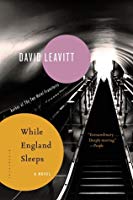A pleasant surprise after putting off trying to read the book for nearly a quarter of a century, was that David Leavitt’s (1993, 1995) novel While England Sleeps was much more absorbing than I expected. I think that Stephen Spender was shocked by the sexual explicitiness of the character based on him and wanted to suppress so unequivocal a portrayal of him as primarily homosexual, though Brian Botsford attempts to will himself to heterosexual functioning and even marriage. There is explicit male-male sex in the novel, before “The Term-Paper Artist,” in which Leavitt took up writing about sex and plagiarism. (There is a lead-off interview in which Leavitt expresses his shock and horror that he had been prevented from writing a variation on publicly described evens and relations, i.e., Spender’s less-than-reliable (for sexual politics) 1951 memoir World Within World. (Brian is a novelist, not a poet, so there is none of the theorizing of engagé poetry. (Nor Spender’s tedious name-dropping…)

Brian does not have the cool detachment of early Leavitt gay men and narration. He seriously exerts himself to save the working-class (tube ticket-taker Edward Phelan) whom he had lad on, sharing a bed with. When Edward discovers that his class-superior lover (i.e., Brian) has been engineering a campaign to marry a suitable (in class and education) girl, Philippa, he joins communist volunteers to fight fascism (and anarchism…) in Spain. Having joined in hurt rejected love, Edward lacks the True Faith of communist ruthlessness and deserts.
Brian goes to Spain to rescue him, though it is an unlikely character of Brian’s own sort, the heretofor dandyish Rupert who scoops down and makes the arrangements to get Edward on a boat headed back for England.
Meanwhile, Nigel, a character based on Christopher Isherwood gets a Germa boyfriend out of Germany, but he and Fritz (Heinz in I’s original) are hounded across Europe and the boytoy ends up in the German army (here, his father is a general).

The book about what happened in 1937 was supposedly written (by Brian, not for publication) in 1978. It has some analyses of sexual orientations that are anachronistic for 1978, let alone 1937, and rather a lot about Underground lines and stations (a fascination of Brian’s, which he shares with Edward, who works down there). And I doubt a real Brit would feel the need to explain class consciousness (centered on accent) to the degree Brian does, but I believe the attitudes surveyed are authentic, and after the first version of the novel was pulped in the UK, the book was revised more for the American market. (The doomed love story gets a trifle melodramatic, I’d say, though the casual homophobia of Comrade Northrop and Brian’s self-criticisms have verisimilitude).
One thing that is certain is that the fascist swallowing up of Europe that the International Brigade was eager to fight (and hopefully stop) in Spain were right that otherwise the fascist tide would roll and affect even those on the sceptered isle who had been more interested in mutton prices than in political repression.
A minor matter is that Brian refers to “the McCarthy era”/apparatus as having led to his being blacklisted in Hollywood. That particular initiative came from the House Un-American Activities Committee, not McCarthy’s Senate select subcommittee.
©2018, Stephen O. Murray

